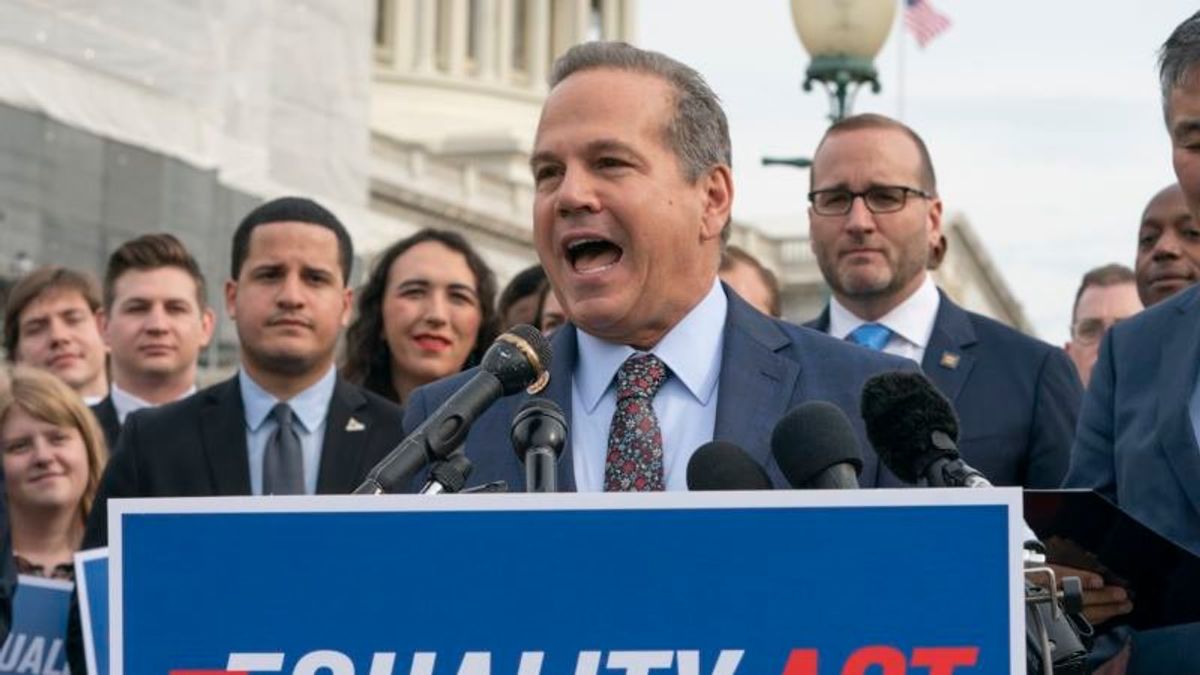
House Approves Bill to Expand Gay Rights
House Approves Bill to Expand Gay Rights

WASHINGTON —
Democrats in the House approved sweeping anti-discrimination legislation Friday that would extend civil rights protections to LGBT people by prohibiting discrimination based on sexual orientation or gender identity. The protections would extend to employment, housing, loan applications, education, public accommodations and other areas.
Called the Equality Act, the bill is a top priority of House Speaker Nancy Pelosi, who said it would bring the nation “closer to equal liberty and justice for all.''
Sexual orientation and gender identity “deserve full civil rights protections — in the workplace and in every place, education, housing, credit, jury service, public accommodations,'' Pelosi said.

The vote was 236-173, with every Democrat voting in favor, along with eight Republicans. Cheers and applause broke out on the House floor as the bill crossed the threshold for passage.
The legislation's chief sponsor, Rep. David Cicilline, D-R.I., said it affirmed fairness and equality as core American values and ensured that “members of the LGBTQ community can live their lives free from the fear of legal discrimination of any kind.''
Cicilline, who is gay, called equal treatment under the law a founding principle of the United States, adding, “It's absurd that, in 2019, members of the LGBTQ community can be fired from their jobs, denied service in a restaurant or get thrown out of their apartment because of their sexual orientation or gender identify.''
GOP opposition
Most Republicans oppose the bill and call it another example of government overreach. Several GOP lawmakers spoke against it Friday on the House floor. President Donald Trump is widely expected to veto the legislation if it reaches his desk.
At a news conference Thursday, the Republicans said the bill would jeopardize religious freedom by requiring acceptance of a particular ideology about sexuality and sexual identity.

Rep. Vicky Hartzler, R-Mo., called the legislation “grossly misnamed'' and said it was “anything but equalizing.''
The bill “hijacks'' the 1964 Civil Rights Act to create “a brave new world of 'discrimination' based on undefined terms of sexual orientation and gender identity,'' Hartzler said. The legislation threatens women's sports, shelters and schools, and could silence female athletes, domestic abuse survivors and other women, she said.
A similar bill in the Senate has been co-sponsored by all but one Senate Democrat, but faces long odds in the Republican-controlled chamber.
'Poison pills'
A Trump administration official who asked not be identified, because he was not authorized to speak publicly about the president's intentions, said the White House “opposes discrimination of any kind and supports the equal treatment of all. However, this bill in its current form is filled with poison pills that threaten to undermine parental and conscience rights.''
Some critics also said the bill could jeopardize Title IX, the law prohibiting sex discrimination in federally funded education programs. Former tennis star Martina Navratilova co-wrote an opinion piece in The Washington Post urging lawmakers not to “make the unnecessary and ironic mistake of sacrificing the enormously valuable social good that is female sports in their effort to secure the rights of transgender women and girls.''

Ahead of the vote, Rep. Jody Hice, R-Ga., called the House bill “horrifying'' and said it could cause Catholic schools to lose federal grants for school lunches or require faith-based adoption agencies to place children with same-sex couples.
Neena Chaudhry, a lawyer for the National Women's Law Center, said the bill does not undermine Title IX, because courts have already found that Title IX protects against gender-identity discrimination.
“It is way past time to fully open the doors of opportunity for every American,'' said Sen. Jeff Merkley, D-Ore., one of the Senate bill's lead sponsors. “Let's pass the Equality Act, and let us rejoice in the bells of freedom ringing for every American.''
In the Senate, Republican Sen. Susan Collins of Maine also supports the bill, while Democratic Sen. Joe Manchin of West Virginia is the sole Democrat who is not a co-sponsor.
The eight House Republicans who voted for the bill Friday were Reps. Susan Brooks of Indiana, Mario Diaz-Balart of Florida, Brian Fitzpatrick of Pennsylvania, Will Hurd of Texas, Greg Walden of Oregon and New York lawmakers John Katko, Tom Reed and Elise Stefanik.
Tags
US Politics Missouri Assembly Passes Restrictive Abortion BillNext PostGovernment Audit: Carson’s $40K Office Purchases Broke Law
Missouri Assembly Passes Restrictive Abortion BillNext PostGovernment Audit: Carson’s $40K Office Purchases Broke Law





